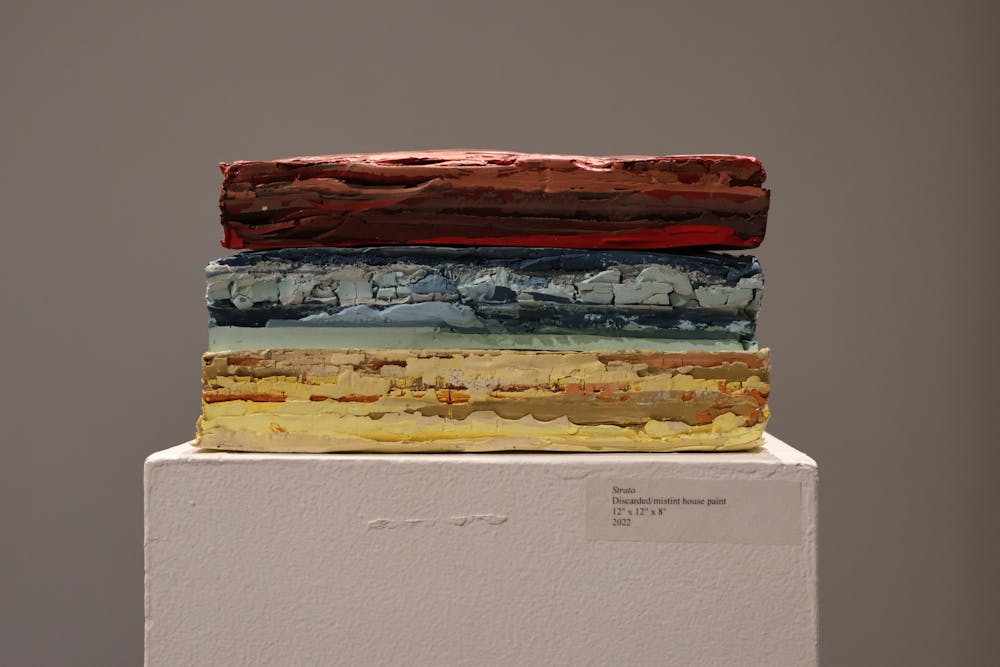Amidst the pandemic and graduate school at Ohio University, Todd Jones developed an interest in consumer culture and materialism, breaking off from his traditional paintings and working with nylon and paint skins.
Jones said noticed an influx of mistinted house paint — paint that was created with the wrong tone or color and typically sold at a discounted price — in 2020, when people were stuck at home doing renovations.
“During the pandemic — especially when people were doing a lot more home and renovation projects — I became really interested in seeing all these paints like at the stores, especially more so because we were all at home so everyone decided to do renovation projects,” Jones said. “A lot of hardware stores would donate them to me or I would purchase them. And it was very interesting because I would use them to essentially pour to make these paint slabs that I would then carve and excavate.”
The collection of carved, discarded paint named “The Forgotten” that Jones has created over the last two years is now on display in Arts West from Aug. 22 to Oct. 19.

Todd Jones’ art exhibition 'The Forgotten:' is on display at Arts West, from Aug. 22 to Oct. 19. The collection is made of carved, discarded paint which shows the connection between consumerist culture and behavior.
Jones said the collection shows the connection between consumerist culture and behavior.
“I talk a lot about my work through the lens of geology and archaeology, understanding our own consumerist culture and behavior, especially with archaeology kind of being the study of pastoralists nations and cultures,” Jones said.
While dabbling in throughout his life, Jones really got his start in art in high school, where he discovered graphic design. With some encouragement from the teacher, he took some more traditional art classes and realized he wanted to do art for a living.
“At that moment, I knew that I wanted to be an artist, and I knew that I wanted to go to college to study art,” Jones said. “Then, while I was in college, I knew I loved teaching. So then I was like, ‘I want to teach art.’ So I was like, ‘OK, I want to be a practicing artist. And then work my way up to becoming a professor.’”
After finishing his graduate degree in Ohio, Jones moved to Raleigh to be a visiting associate professor and gallery director at Meredith College.
Jones wanted to get involved in the local community, and when he saw the posting for an art exhibit at Elon, he knew he wanted to reach out.
“I'm always looking for ways to engage with the local community and the surrounding areas. And I recently moved here about a year ago, and I always keep my eye out for shows and things like that,” Jones said. “When I saw it, I was like, ‘Oh, I recognize that name. And that's right down the road.’ So I am always looking to try to expand my reach to the community. So that was one thing that really stood out to me.”
Gallery Director and art professor Michael Fels said he usually receives up to 200 applications for the 5 to 7 exhibitions the university hosts per year. When choosing which artists to highlight, Fels looks for timely pieces of dialogue. What drew him further to Jones was the concept behind the material, which he said he wanted to express to the senior art students who will be writing a thesis throughout the year.
“There may be artists that approach work through the material and not delving as deep about the concept or the theory around the work, but just the work of the material itself. There's others that do more conceptually driven work, where the materiality becomes a second, or an afterthought,” Fels said. “Todd, in his proposal, he talks about how both are equally important. And that's what we want with our students.”
Fels said he hopes Jones’ exhibition inspires topics for his students’ theses.
“By bringing him in at the beginning of the semester, when our seniors are just starting to develop their ideas, they'll get to hear somebody that's able to talk about how you deal with your concept and the art … and then help have both of those kinds of work together for stronger exhibitions,” Fels said.
Jones said making art is problem solving and a learning process.
“Art encompasses so much of our daily lives and just in general art, to me, it's just creative problem solving. And for me, in general, I always love seeing creative ways of solving problems,” Jones said. “I don't see any piece as being like a particular failure. It's like a learning process.”


